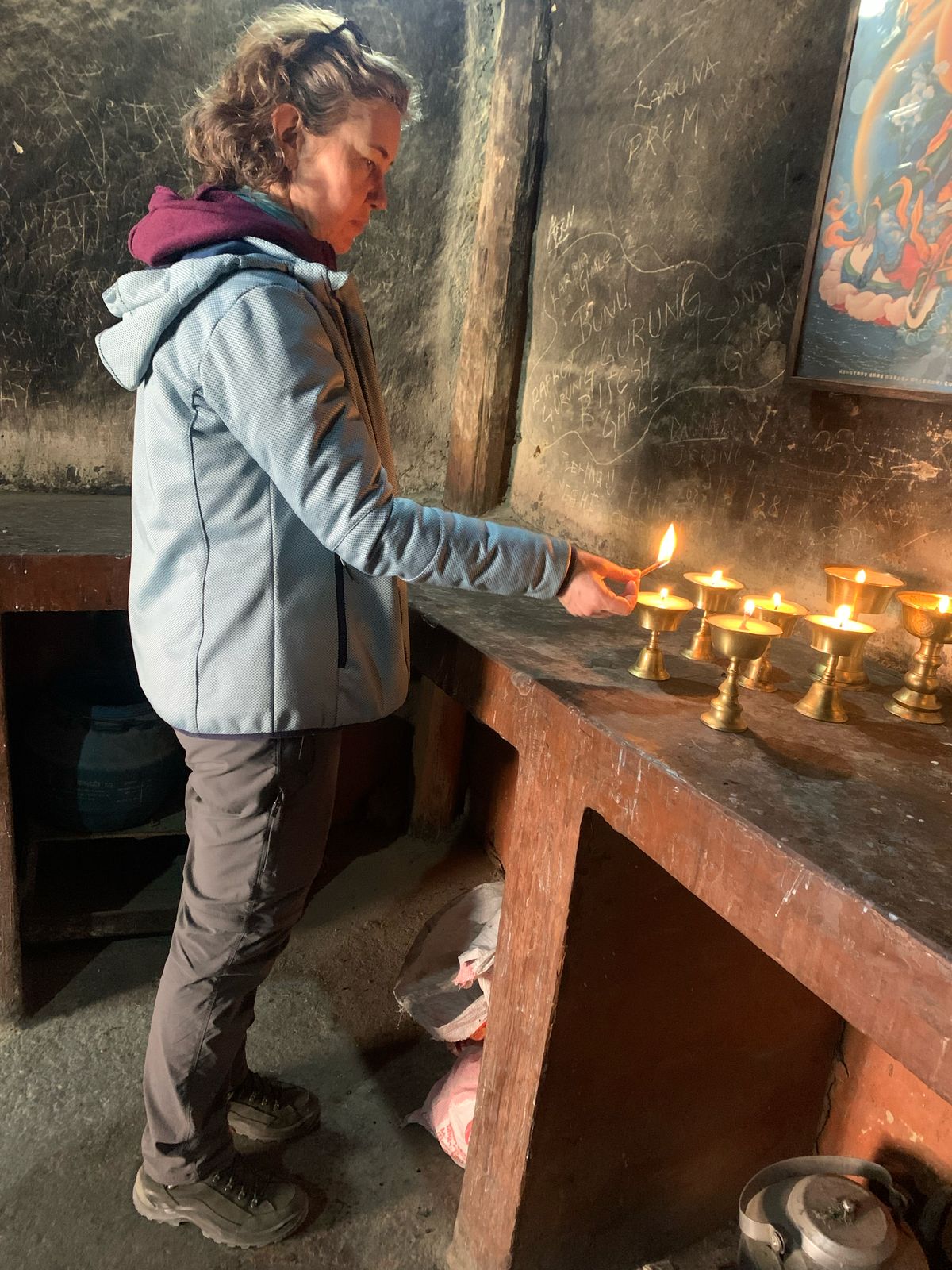Travel Report Mustang 2025 - Part 2
Apr 12, 2025

The following day often moves me to tears from sheer overwhelming beauty of nature and happiness to experience it.
Dawa organizes a motorcycle for us, and we explore Lower Mustang from Kagbeni. The gorge with its rock needles alongside the wide riverbed brings new, deeply impressive images as we first head towards Dhumba Lake, which is a sacred lake for Buddhists, located at 2830m. I quickly realize why the lake is sacred. I stand in awe before a scene that could come from the most beautiful wallpaper - if it weren't real. Before me lies a lake in beautiful, clear turquoise, framed by conifers that open towards a monastery on a rocky plateau in the background. Behind it rise the snow-capped peaks of the Himalayas under almost completely blue sky; the image couldn't be more picturesque. I look at Dawa and say, 'Thank you, I don't know what to say. This is amazing, so beautiful!' 'You like it? Good. You happy, me happy.' He will say this phrase very often in the coming days.
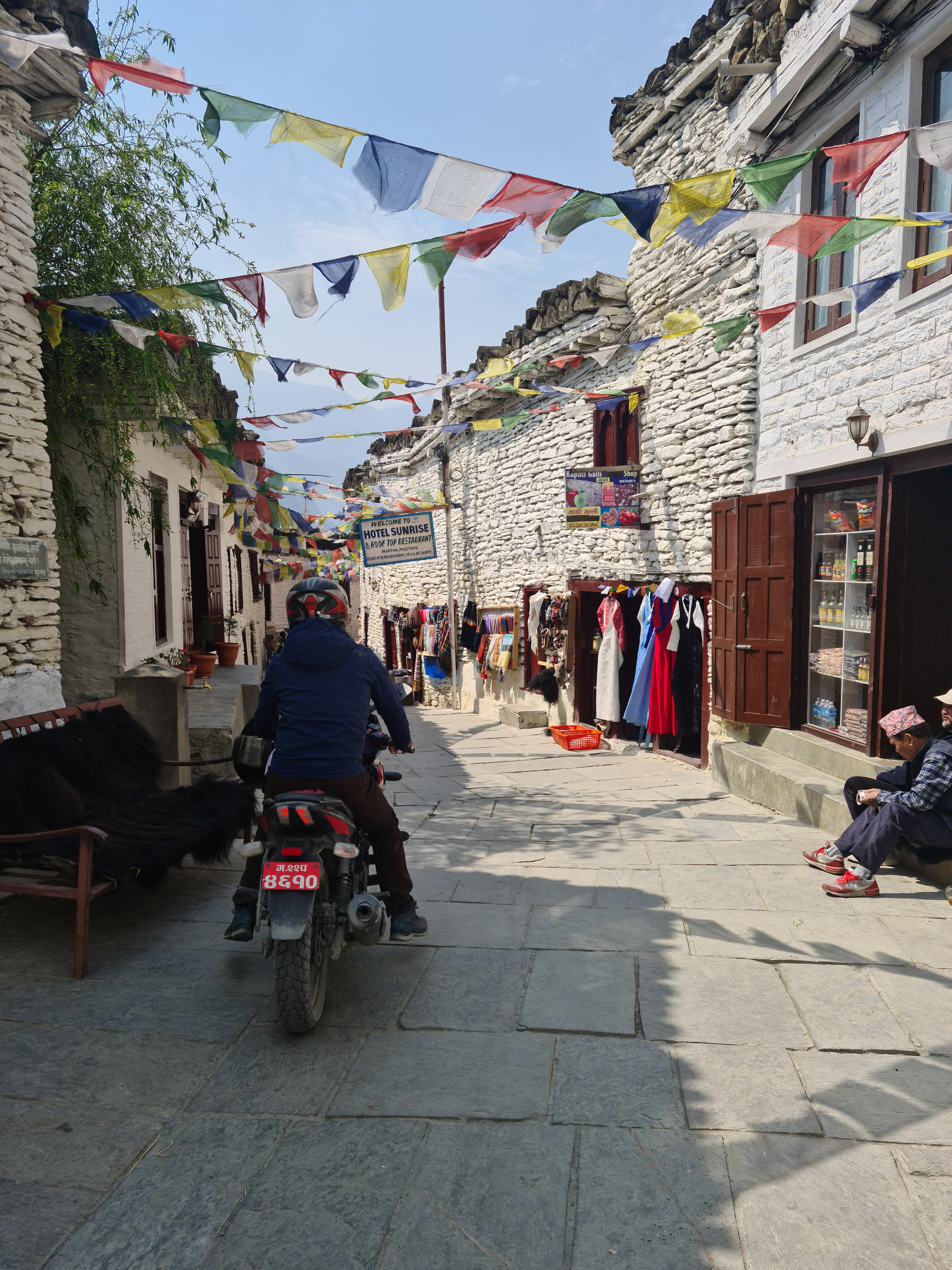
We walk around the lake, then we get on the motorcycle and drive to the monastery. I have already seen some old Buddhist monasteries in the Himalayas, and more will follow. They are just as similar as Christian churches. I enjoy every visit and delight in the ever-present smell of butter lamps, smoke, and age. It is beautiful here; we light three butter lamps each (always an odd number, 7 would be best, but 3 is good) and I give the Lama who opened the monastery for us a small fee. When lighting the butter lamps, one must be careful not to breathe over the flames, as it brings misfortune. And above all, one must not blow out the long candle used to light the lamps, I have already learned this and am very diligent in trying to remember and not act on reflex.
Next, we go to Marpha, a fairly well-preserved village on the other side of the river. Since the passage through Marpha is currently closed, Dawa drops me off at the top and drives down the river to the other end to pick me up again. This way, I can wander through the place on my own and once again find that it doesn't matter where you are in the world, people everywhere are the same: Marpha is a typical tourist spot. Flags hang over the alleys; the shops on the left and right sell the same things; there are few original products, and most of it is 'Made in China'. But the place is really pretty! At the end of the street, I see Dawa, who is already ready with the motorcycle. 'What good?' 'Yes, really nice - just too many tourists!' 'Just wait. Tomorrow we go to Lomanthang, no tourists!' Well, that will be something! We continue to the highlight of the day, heading to Muktinath at 3800m elevation. The drive there is unparalleled in views, and I again wonder how people can come up with the idea to settle in this nothingness?? I am completely captivated by the colors and shapes that the mountains display here, and again and again - to ensure that you still know you are in Asia - there is a stupa simply in the way. Or prayer flags hanging from a mast, pulled down on all sides towards the ground.
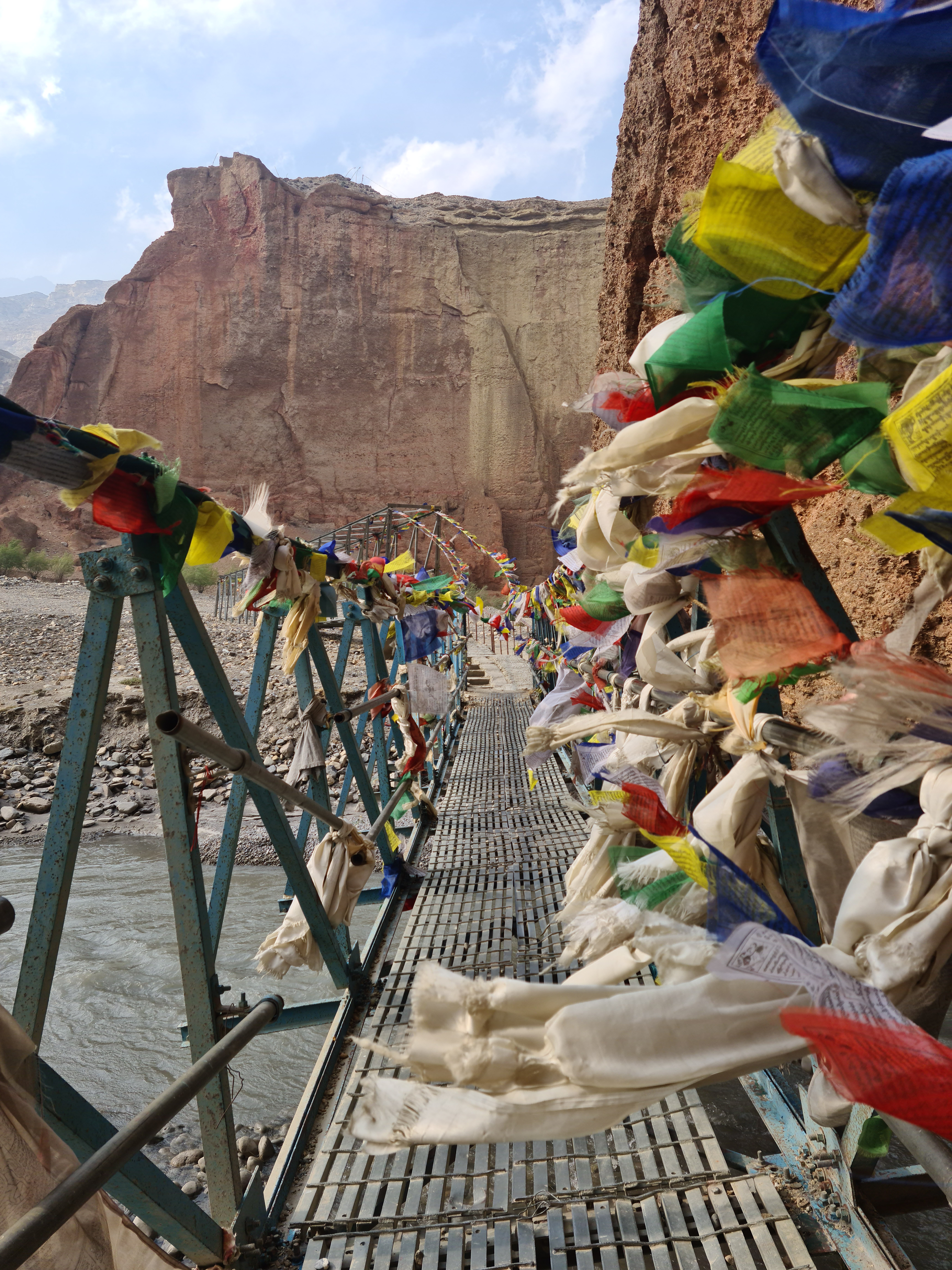
Towards Muktinath, I notice that this must be an important place, as more and more jeeps pass by us, many of them with Indian license plates. Muktinath is one of the most important pilgrimage sites for Hindus; 108 springs emerge here, in whose water people bathe. Not for me; first, it is really cold, second, these Nepali mass baths really do not suit me, where murky water is contained in a concrete basin, and you queue up to perform a (religious) washing while fully clothed. At the springs, it is as noisy and bustling as it always is among Hindus. We continue walking, and I see a large Buddha statue, and it gradually becomes quieter. The Buddhists are the calm side of Nepal; we peacefully circle the statue, turning all the prayer wheels. Then we go into the temple, where the familiar atmosphere greets me again, but in the middle at the front is a stone, under which it seems important to be, as some people are kneeling in front of the stone, looking underneath, and then leaving. Dawa explains to me that there is an eternal flame coming from the ground there, which is sacred. Do I want to see it? Sure, so we take off our shoes and head inside. When it’s my turn, I actually see a small, blue flame coming from the ground. Later I read that this is a natural gas flame. I seem to be suitably impressed; Dawa is satisfied and briefly turns to the altar. He prays briefly and shows his respect by touching his forehead to the altar multiple times. Now we are pretty much done with the program for today, but we still have time. The motorcycle is rented for the whole day, so we just drive back down to the main road up the valley, and I admire the landscape. Again and again, I ask Dawa to stop to take another photo; it's just so beautiful here! At some point, I notice that all the photos look the same. All great, but all the same. So we just drive, and I look around, overwhelmed. At a bridge, we turn back; it’s getting late. One more photo, as I haven’t taken one with prayer flags over a suspension bridge yet. At least not with red rock behind it. I think. 'Tomorrow, we will take a jeep to Lomanthang.' Yes, I will join!
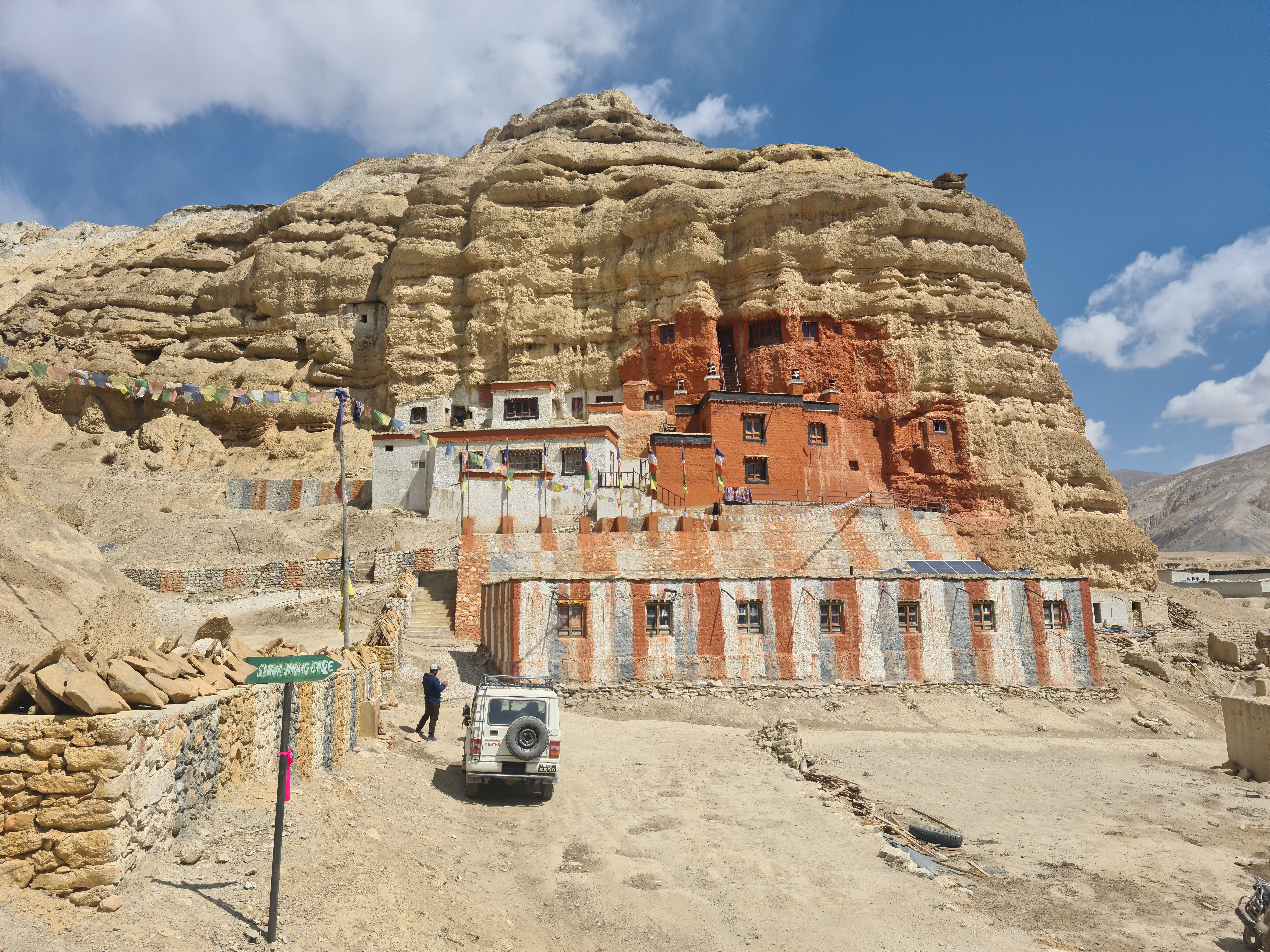
Lomanthang is the former seat of the kingdom of Mustang and the northernmost point of our journey. Here we are again very close to the Chinese border. The ride here in the jeep is also an experience. I am, as Dawa announced, the only tourist and am closely watched by everyone; unspoken, the front seat next to the driver is naturally mine. I don't like this favoritism, but I go along with it. With a brief statement to Dawa that I find it silly and don’t want it - and he doesn't quite understand what I am saying. Why not? This way I have the best view! We slowly bump up the road; it takes several hours, and I am really happy about my sturdy stomach; not everyone is so lucky. We pass incredible landscapes, barren and bizarre; I have mentioned this frequently, but it will remain so until the end of our journey. Along the way, we stop for lunch. There is of course Dal Bhat, but really authentic Dal Bhat. 'Is it very hot?' 'No, I don't think so; you will like it!' He is right; the dal (lentil soup) actually tastes good, is quite spicy, but delicious. The takari, the vegetable curry (I prefer to always take vegetables, I need some courage for the meat), is also really tasty, and well-mixed with rice, it’s good to eat. Then the pickles come, and I lose my breath. In my entire mouth area, including the palate and under the tongue (!), I feel pain from the spiciness. Of course, I can’t spit it out, so I have to swallow it all. I swallow and feel my esophagus burning slowly, then I momentarily can’t breathe. After a while, I can speak again. 'Dawa, what is this??' I point to what I just ate. 'Oh, that is pickle, mountain herbs, typical Tibetan kitchen, very nice!' 'It is very f***ing hot! You should have warned me!' 'Are you crying Simone???' Aha, now he is worried and hands me a napkin for my nose, then he tries the stuff. He clicks his tongue appreciatively, 'This is very good, Simone, you tried?' I sit there with my mouth open and take another napkin. 'I am German Dawa!' I cry. He understands and starts laughing; the whole room is now looking at us, and Dawa openly explains my condition. Everyone laughs and enjoys my tears, then I laugh too, and the hostess brings me some cooked rice. It takes a little while before I can eat again. The stuff, the pickled mountain herbs, I leave behind. As tea from the Alps, I much prefer herbs to - this!!
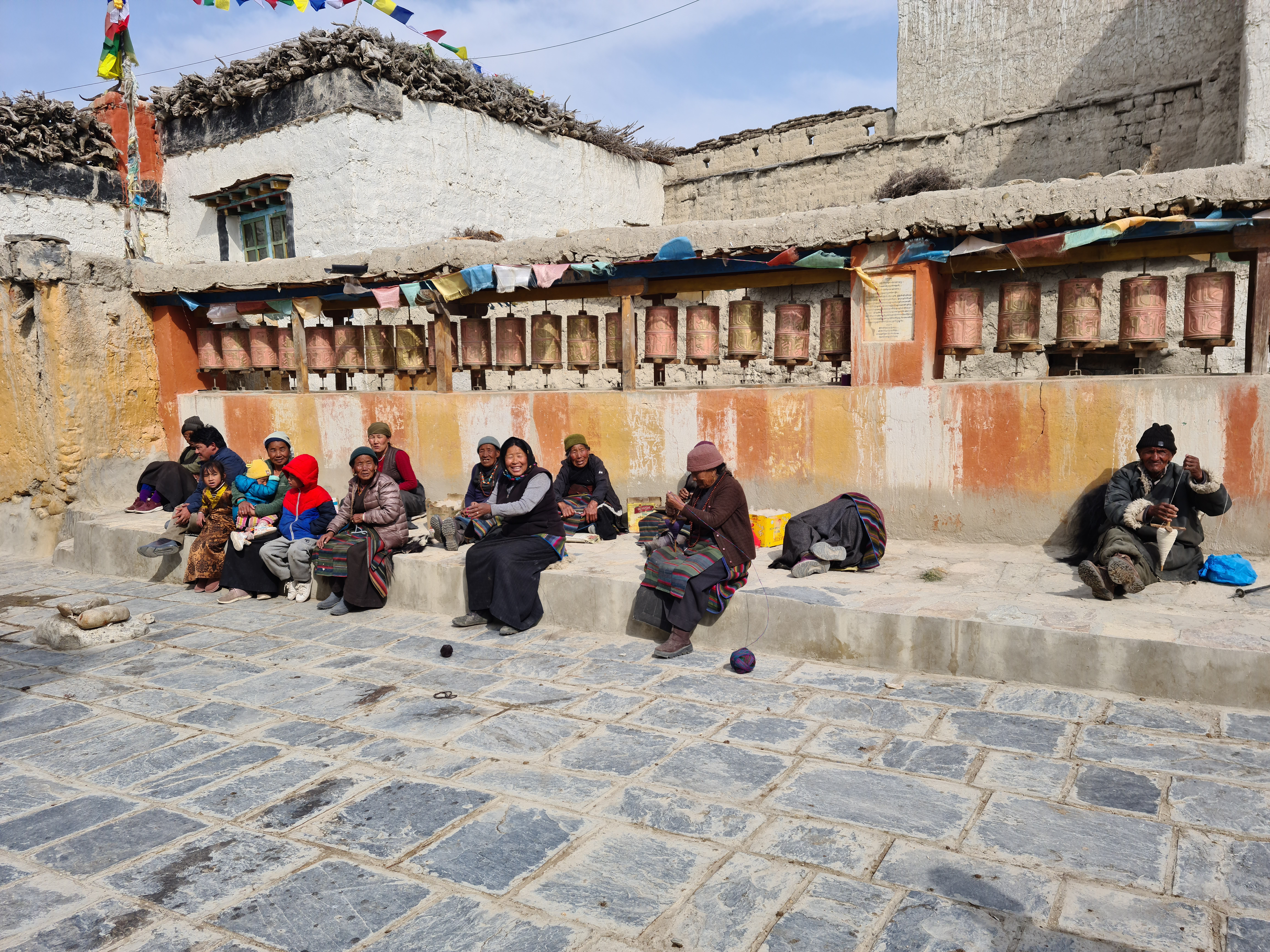
We arrive in Lomanthang in the afternoon and check into our hotel. I immediately notice that it is quite cold, but I think nothing of it at first; outside, the sun is shining, and that’s enough for me to dress normally in a layer of merino wool. We stroll again through the quite old place, which doesn’t really differ from Kagbeni, with the once whitewashed, flat houses and narrow alleys. People are often seen sitting together in groups, talking and spinning wool with hand spindles. We are always greeted kindly, and Dawa speaks fluently with everyone; I can now recognize when he speaks Tibetan. As the sun sets, it quickly gets cold; we go back to the hotel - and now the temperature in the rooms feels very different. I see no stove anywhere, as is the case in the well-known Langtang-Tamang area, where there is always some form of heating in the dining rooms. Not here. No trees, just dung; they don’t heat up for warmth, I believe I have mentioned this before. So I change for dinner into my thick merino clothes and appear with all three jackets layered on top in the dining room. The Nepalis look just the same; I am not the only one who is cold! The night will, to put it cautiously, not be fun. I’m in merino in my down sleeping bag with two blankets on top, which are all cold too. Since I’m freezing, I probably don’t warm the blankets up properly, and the mattress is radiating all the cold it has collected over winter, which doesn’t help at all. At some point, I freeze myself to sleep. Who had this idea of Mustang?? But I reflect on the day and am very, very happy. Shivering-happy. Shivering from cold. The next morning, Dawa asks me how cold I was. I just look, he laughs, he was cold too. 'I got a jeep for today.' Oh great, we will drive around the area and see a rock monastery, which reminds me a bit of the caves in Qumran in Israel. Various rock caves, which were home to hermits many hundreds of years ago, throne high above. We climb up, then it continues with ladders. I am not overly anxious and also have no fear of heights, but this is really not easy. I keep climbing and marvel at what ideas people can come up with. Living here is already remote and difficult enough; must I then also crawl into caves? Apparently, I must. We continue driving, a rock monastery, and always more landscape. In the afternoon, we visit two monasteries in Lomanthang, both of which are old and beautiful and have a nice scent. A lama shows us the way, and I follow the outstretched hand when Dawa suddenly jerks me back quite unceremoniously by the sleeve. 'Lama goes first!' OK, then I let the roughly 15-year-old boy go ahead, my apologies.
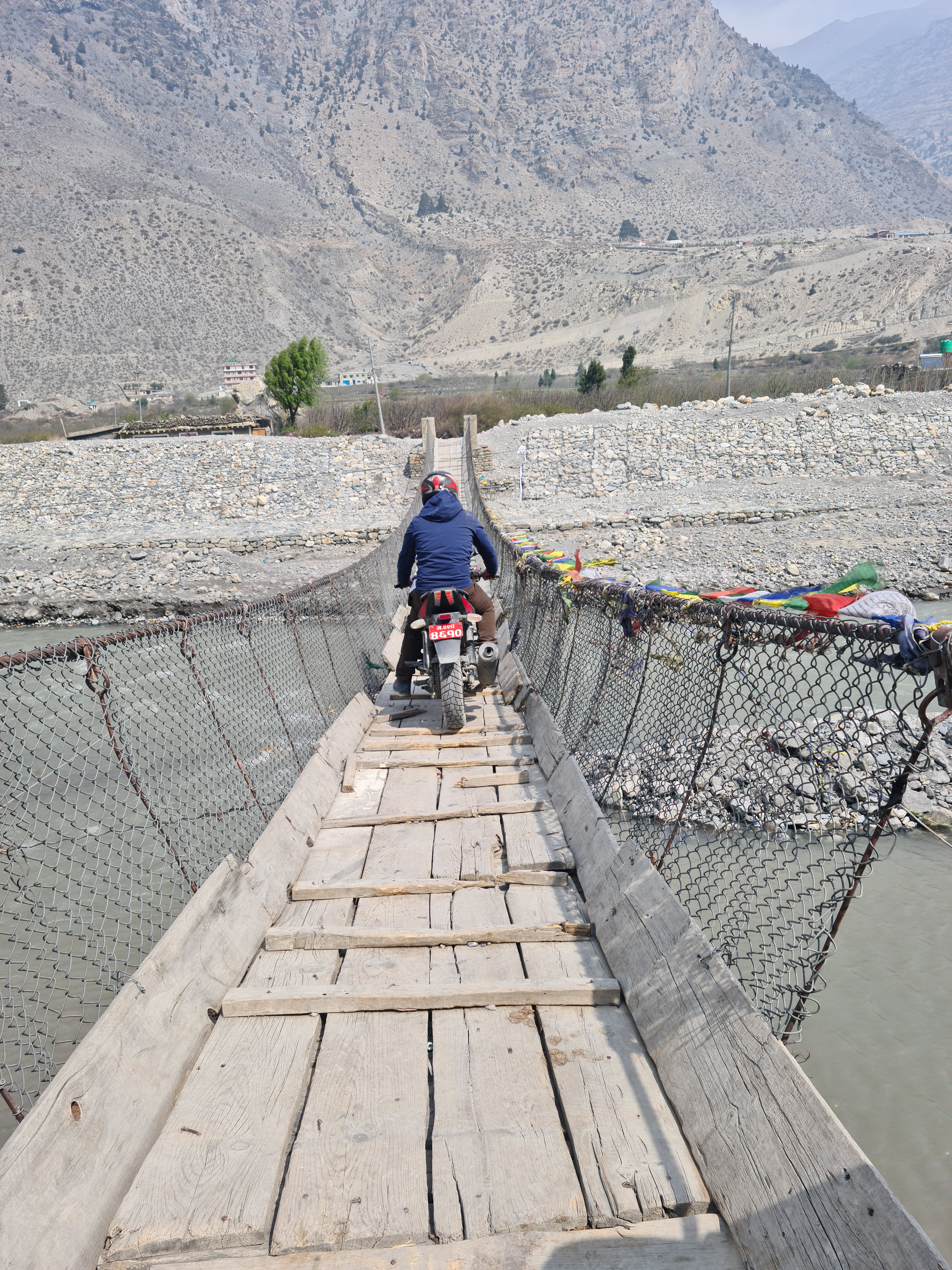
On the way back to the hotel, we again pass many cheerful chattering people, who always gather in windless, sunny corners; Dawa always stops for a chat. I take the opportunity and always turn to the animals that are available here. Many cows and dogs, and a few horses. Dawa always interrupts his conversation, 'Don't touch the dog Simone, they can bite.' No, this one is putting its ears down and wagging its tail; it won’t bite me. I cautiously approach and stroke the black animal on the nose, not really touching the rest of its fur, as you sink inches deep into fur, dirt, and parasites. But the dog enjoys getting its nose stroked and wags even more; Dawa rushes over, 'We are going.' Ok. At the next stop, I befriend a cow; it has very beautiful eyes. 'Simone, they can hurt you with their horns, stay away.' But she looks very curious and holds her head out to me. 'We are going, there is a local tea shop.' OK, I could use a milk tea right now. After we have paid, a herd of horses walks by outside. 'Simone, no, they kick.' No, they won’t if they look like that; just look how pretty - Dawa's very stretchy patience snaps, and he pulls me away. 'Why don't you listen? These are not German animals; they are half wild. They kick and bite and use their horns; they don't like us.' But they like me, and if not, you can see that. The subject of animals remains a point of contention between us, and I often lower myself during the trip, frequently with the instruction not to roll my eyes.
In the evening, we discuss over dinner how it will continue. I cannot manage the return journey alone; luggage, altitude, and the last two stages, which extend over 20-30 km without any possibility of a stop in between, I really can't do that. 'We will go first on our own, then for the last two days we will get a horse.' Oh yes, a horse, how wonderful. Dawa looks annoyed. 'You ride, don't touch!' Hm, we will see.
